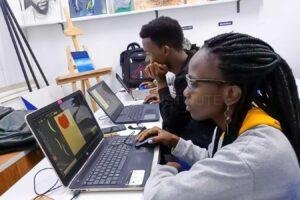
What do they study in film school? – Film production courses
- Posted by Michael
- Categories Education Blog
- Date 10 October 2024
- Comments 0 comment
In film schools in Kenya like Visualdo Film School, students study various aspects of filmmaking, from the creative and artistic to the technical and practical. The film production curriculum at Visualdo is designed to give students a well-rounded education in both the theory and hands-on application of filmmaking.
Key areas of study in film school typically include:
1. Film Theory and History (Film production course)
- Film Theory: Students learn about different cinematic theories, including how films communicate ideas through visual storytelling, editing, sound, and narrative structures.
- Film History: Understanding the evolution of cinema, major film movements, and influential directors helps students gain perspective on the art form’s development over time.
2. Screenwriting (Film production course)
- Students learn the fundamentals of writing for film, including developing characters, crafting dialogue, structuring plots, and writing compelling scripts.
- Courses often involve writing short films or features and understanding how to translate written narratives into visual form.
3. Directing (Film production course)
- Film directing courses teach students how to work with actors, make creative decisions, and oversee the entire production process.
- Directors also learn how to visualize scripts, communicate with the crew, and make key decisions on set.
4. Cinematography (Film production course)
- Students learn the art of visual storytelling through the use of cameras, lenses, lighting, and composition.
- They explore different camera techniques, lighting setups, and how to create a specific mood or tone through cinematography.
5. Editing (Film production course)
- Editing courses focus on how to cut and arrange footage to tell a cohesive and engaging story.
- Students work with software like Adobe Premiere, Final Cut Pro, or Avid to learn the technical skills of assembling a film and the creative process of pacing and timing.
6. Sound Design (Film production course)
- Sound design classes teach students how to record, edit, and mix sound for film.
- Film students explore how sound effects, dialogue, ambient noise, and music all contribute to the overall atmosphere and storytelling.
7. Production Design (Film production course)
- This area covers the creation of the visual world of a film, including sets, props, costumes, and the overall aesthetic design.
- Students learn to collaborate with directors and cinematographers to bring the film’s vision to life through design.
8. Producing (Film production course)
- Producing classes focus on the business side of filmmaking, including budgeting, scheduling, fundraising, and organizing the logistics of a film production.
- Producers also learn how to manage teams, oversee the creative process, and ensure the film gets made within its budget and time constraints.
9. Acting for Film (Film production course)
- Students can also learn courses in acting to understand how actors work, improving the director’s ability to communicate with performers.
- Students may also learn to analyze performances and work with casting.
10. Documentary Filmmaking (Film production course)
- Documentary courses teach students the fundamentals of nonfiction storytelling, including research, interviewing, and how to capture real-life events.
- Students explore ethical considerations and the technical aspects of shooting and editing documentaries.
11. Visual Effects (VFX) (Film production course)
- Students are introduced to the world of digital effects, learning how to enhance or create visuals that are difficult or impossible to achieve through traditional filming.
- Courses typically cover compositing, 3D modeling, animation, and special effects.
12. Film Criticism and Analysis (Film production course)
- Critical analysis classes teach students to analyze and critique films, fostering a deeper understanding of film form, style, genre, and the cultural implications of cinema.
13. Collaborative Filmmaking
- Many film schools emphasize group projects where students work together in roles such as director, cinematographer, editor, etc., to simulate real-world production environments.
- Collaboration is a key part of filmmaking, and students often rotate through different positions to understand all aspects of the production process.
14. New Media and Experimental Film
- Some film schools include studies on emerging trends in media, like virtual reality (VR), interactive storytelling, and non-traditional narrative forms.
- Experimental film classes explore avant-garde approaches to film structure, content, and style.
15. Film Distribution and Marketing (Film production course)
- Students learn how films are distributed to audiences, whether through festivals, theaters, or online platforms.
- Courses may also cover the strategies for marketing a film, including creating trailers, posters, and social media campaigns.
Overall, film school offers both theoretical and practical training, allowing students to develop their skills in all facets of filmmaking and prepare for careers in the film industry.
Related
You may also like

Top 10 Best Digital Marketing Schools in Nairobi CBD
26 December 2024

Master Digital Marketing in Kenya: 2025 College Guide to Success
25 December 2024

